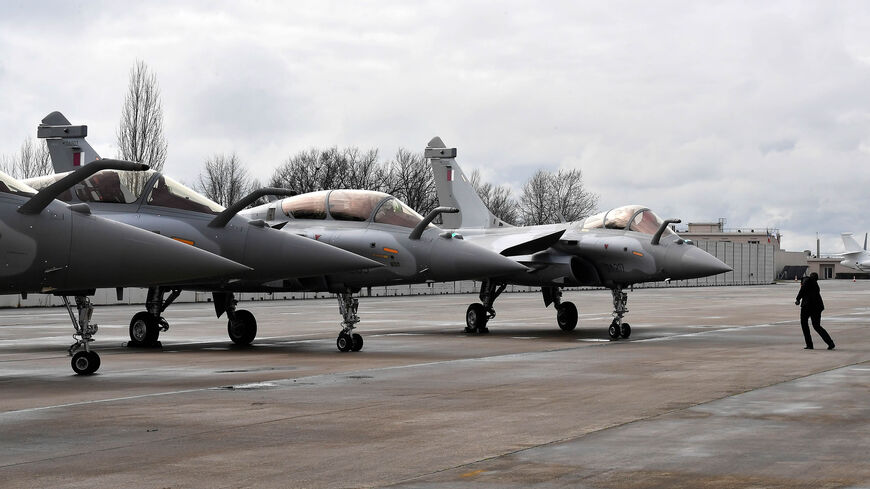France is aiming to bolster its presence as a leading security guarantor and partner in the Gulf, using military cooperation and arms sales as diplomatic tools to advance its regional influence. Most recently, France and Qatar engaged in advanced talks as Paris hoped to upgrade their bilateral ties to a defense partnership, according to a French Defense Ministry source.
The recent talks largely aimed at “strengthening the Franco-Qatari strategic partnership, founded on diplomatic, operation and industrial cooperation,” according to the source who spoke to Reuters last week. However, with France having sold Qatar 36 Rafale multipurpose fighter jets following past agreements in 2015 and 2017, Paris would hope to supply further defense equipment to Doha.
It follows France’s Emmanuel Macron hosting Saudi Crown Prince Mohammed bin Salman in Paris in June, meeting for the second time in less than a year. Notably, Paris has become an important arms supplier to Riyadh, with sales amounting to nearly 780 million euros ($856 million) in 2021, according to data from the French Ministry of Armed Forces. Macron hopes to leverage these defense ties and his government’s fledgling diplomacy with Prince Mohammed to boost bilateral investment relations while solidifying Paris’ defense aspirations regionally.
Amid Paris' diplomatic pursuits, the United Kingdom is also on a mission to strengthen its ties with the Gulf Cooperation Council (GCC) countries. Last week, British Foreign Secretary James Cleverly embarked on a three-day tour of the Middle East, making stops in Qatar, Kuwait and Jordan, and aiming to solidify relations with these regional allies. Following Brexit, the United Kingdom is eager to boost relations with the GCC countries, emphasizing trade as a key focus in Cleverly’s visit. The Foreign Ministry lauded London’s 18.1 billion pound sterling ($23.2 billion) in bilateral trade with Qatar and Kuwait in 2022.
This uptick of French and British involvement in the Gulf comes in the context of increasing disengagement of the United States in the Middle East, as the US administration focuses more on the Asia-Pacific region and Ukraine. As a result, its traditional Gulf partners are seeking to diversify their partnerships beyond Washington, thus increasing competition for arms contracts and economic relations.
France has particularly sought to position itself as an alternative to the United States, utilizing what is often described as its “third way” diplomacy, with weapons sales becoming an increasingly key element of its policy toward the Gulf. In 2022, France surpassed Russia to become the world’s second-largest arms exporter for that year, according to data from the Stockholm International Peace Research Institute, while the United Kingdom ranked sixth.
Increasing focus on Qatar, Saudi Arabia
Although France has traditionally anchored its influence around the United Arab Emirates (UAE), where it possesses a key naval base, its recent attempts to build upon partnerships with Qatar and Saudi Arabia indicate a more comprehensive strategic approach in the Gulf.
Along with arms sales, France has aimed to solidify its role as a security guarantor in the region, evidenced by its deepening partnership with the UAE. In February 2022, Paris established a security partnership with Abu Dhabi, offering increased military support and airspace protection following the drone attack on the Gulf state by an Iran-backed faction in Iraq. This move underscored France's hopes to alleviate security anxieties among Gulf nations, particularly amid tensions with Iran.
As Tobias Borck wrote for the Royal United Services Institute, London has traditionally perceived itself “as the number two external power in the Gulf … with a military presence in the region second only to that of the US (though by a considerable distance).” Yet with both France and the United Kingdom holding relatively equal weight regionally, Paris’ moves aim to position itself as a leading European partner regionally.
On the one hand, the United Kingdom has also cited security as a motive for its engagement with the Gulf. Indeed, the 2023 update to the UK government’s Integrated Review (a manifesto of its foreign policy) stresses the need to support the US-led international order, calling for Washington’s allies to “step up our collective contribution to burden-sharing both in the Euro-Atlantic and across geopolitical hotspots including the Gulf.”
A significant arms partner to Saudi Arabia, having licensed over 10 billion pounds ($12.8 billion) worth from 2012 to 2022, Britain has sought to deepen its security ties with Riyadh. In December 2022, London solidified its relationship with Riyadh by establishing a Defense Partnership aimed at enhancing “regional security and stability.” Building on this framework, a subsequent meeting between the Saudi and British defense ministers in March 2023 resulted in an agreement to explore collaborative efforts in combat air capabilities and potential industrial projects.
To bolster its presence in the Middle East, Britain has redeployed assets, including moving a military base from Canada to Oman. In addition, it has increased joint military exercises with Muscat. These moves signify Britain's commitment to bolstering its engagement in the region and reinforcing its defense cooperation with key allies.
While this grants London greater power projection capabilities in the Middle East, Britain’s desires to boost its commercial relations with the region following Brexit are still its main priority. Much of this discourse has been centered around securing a free trade agreement (FTA) with the GCC, which would increase British-Gulf trade by at least 16% and make London the first country to acquire an FTA with the bloc.
Diplomatic advantage over UK
In comparison, Macron’s government has clearly pressed for a more coherent diplomatic vision for the region compared to the United Kingdom, which has largely aimed to strengthen its traditional commercial relations and support the US-led regional order. Such a move may benefit France over the United Kingdom in advancing ties with the Gulf, particularly Saudi Arabia and the UAE.
However, France has still faced obstacles for its arms diplomacy, owing to the deep competition from global and regional powers like China. An example of this occurred when the UAE backtracked on plans to buy helicopters from Airbus in May, as part of an agreement with Paris in 2021, though Abu Dhabi still plans to proceed with acquiring Rafale fighter jets. Such a move signifies that, while Paris’ defense partnerships are increasing and welcome, Gulf states have many choices in partners, and this could limit Paris’ own leverage.
Despite their individual diplomatic efforts, both France and the United Kingdom rely on partnerships with the United States for regional naval patrols, such as in the Strait of Hormuz. Since Brexit and the absence of a unified European Union foreign policy in the Gulf, Paris and London would have to accept a lesser role in the region while vying for Gulf investment and economic ties against other global and regional players in an increasingly competitive environment.








